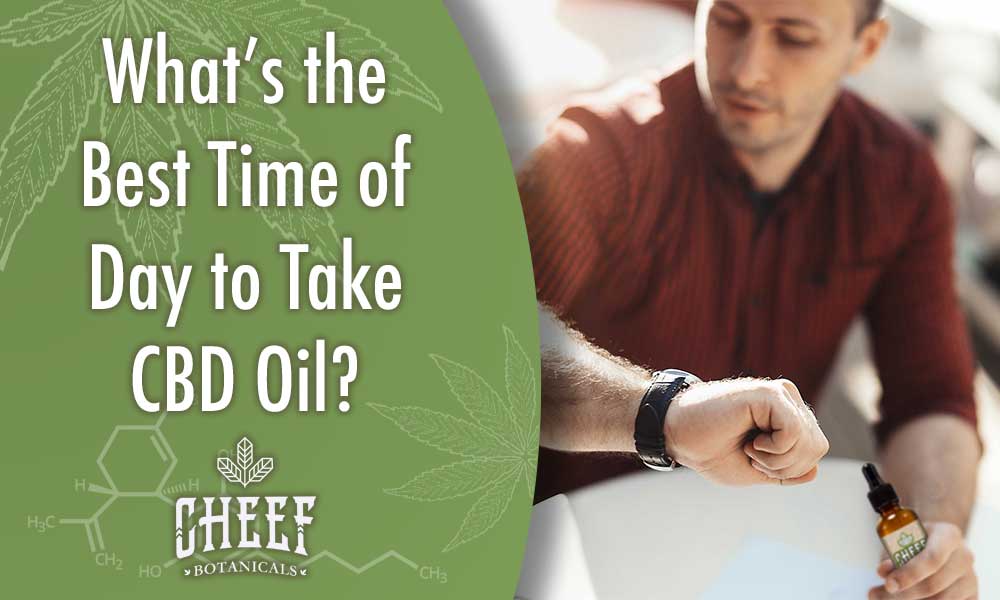What is the Best Time of Day to Take CBD Oil?
Do you take CBD oil? Did you know its effects can vary depending on how much you use and how often you take it? That means you can take some in the morning if you need a little pick-me-up or at night if you need something to calm you down. Alternatively, you may want to take it only for relief, or twice a day as a regimen to promote overall health and wellness. So, what is the best time of day to take CBD oil? Well, the answer depends on what you're looking for.
What Is CBD Oil?
Before we go over what time of day to take CBD oil, let's do a little breakdown of what it is for those who don't know. CBD oil is extracted from the cannabis plant, or CBD Flower, and is rich in cannabidiol (CBD). In fact, the primary active ingredient in CBD oil is CBD, which belongs to a group of compounds known as cannabinoids. Cannabinoids can be divided into two groups.
- Endocannabinoids (or endogenous cannabinoids) – These are naturally produced in the human body.
- Phytocannabinoids – These are extracted from the cannabis (hemp) plant.
CBD is a phytocannabinoid that works by interacting with our endocannabinoid system (ECS). Your ECS is made up of cannabinoid receptors known as CB1 and CB2 receptors that are spread all throughout your body.
So what does all this mean? What does the ECS actually do? Well, influential scientists, Dr. Vincenzo Di Marzo summarized its functions as: “relax, eat, sleep, forget, and protect.”

This is just a snappy and concise way of saying that the ECS regulates:
- Pain and inflammation
- Reward and motivation
- Appetite, digestion, and metabolism
- The functioning of the immune system
- Memory
- Emotional states and mood
- Body temperature
It goes without saying that the ECS is incredibly important. If it is functioning properly, then your body will be in a state of harmony and balance known as homeostasis. Taking CBD regularly helps keep your cannabinoid levels healthy, thus promoting your homeostatic state.
Why Do People Take CBD Oil?
First and foremost, in accordance with FDA regulations, since we manufacture CBD products we cannot make any medical claims whether or not CBD can help with specific ailments. We do, however, suggest that you conduct your own research. There are tons of independent, peer-reviewed studies about CBD available on the internet. We advise discussing CBD with your physician or healthcare practitioner regarding any health-related questions or concerns you may have. These products are not intended to treat, cure, diagnose, or prevent any disease.
With that being said, many people take CBD to promote their overall health and wellness. CBD is known for its calming effects. Many claim it increases clarity and helps support mental wellbeing. While others use it for a better night's rest. The list of CBD's benefits is lengthy. It’s important to remember that all CBD research is ongoing, but so far the results are very promising!
Additionally, full-spectrum CBD oil is rich in vital nutrients that many modern diets frequently lack. These include:
- Essential fatty acids
- Essential minerals and vitamins
- Chlorophyll
- Flavonoids
- Terpenes
- Other cannabinoids in trace amounts
We live our lives on the go and frequently miss out on meals that have all these necessary nutrients, so regular administration of full-spectrum CBD oil can help us avoid these deficiencies.
Speaking of deficiencies, some scientists theorize that a defected ECS can cause insufficient endocannabinoid production known as Clinical Endocannabinoid Deficiency (CECD). Additionally, they theorize CECD could be the root cause of migraines, fibromyalgia, irritable bowel syndrome (IBS), and more. However, CECD research is still in its infancy.
What's The Best Time of Day to Take CBD Oil?
Despite the fact that CBD does not intoxicate the user, it still has subtle effects on how that user may feel. Remember, it is a highly versatile compound with numerous mechanisms of action. Taking CBD oil at different times of the day can create different effects.
Should You Take CBD Oil in the Morning or at Night?
One of the more fascinating aspects of CBD is that it is biphasic. This is just an elegant way of saying that it may act as a sedative or a stimulant, depending on the dosage amount. CBD is not entirely unique in this regard; both caffeine and alcohol exhibit similar effects.
A 2004 study in the Journal of Clinical Psychopharmacology concluded that 15-milligrams of CBD (a lower dosage amount) acted as a stimulant in healthy subjects.
Surprisingly, the anecdotal evidence also suggests that CBD reverses the intoxicating effects of other cannabinoids like THC. For example, the subjects in this study felt “clear-minded” and “quick-witted” on CBD and “fuzzy” on THC.
On the other hand, a 1981 study concluded that 160-milligrams of CBD (a higher dosage amount) sedated subjects and increased the duration of their sleep.
Additionally, a study from 1993 concluded that higher dosage amounts (300-milligrams and 600-milligrams, respectively) caused significant sedation in patients when compared to the subjects who were given a placebo.
So what does all this mean? Well, the biphasic properties of CBD suggest that it can have two primary effects: sedating or stimulating. Which effect are you looking for?
If you want a slightly stimulating effect, perhaps mixing in with your morning coffee, then you should take a lower dose in the mornings. If you are looking for help calming down and sleeping, then take a higher dose in the evenings.
Taking CBD Oil 2 Times a Day
Now, let’s take a moment to recall that CBD is excellent at inducing and maintaining homeostasis. This is a continuous state, so that means that CBD can be highly effective when taken twice a day as a daily regimen.
Taking CBD twice a day by splitting up your dose is an excellent way to keep your cannabinoid levels where they need to be. This will maximize its efficacy and allow you to get the most out of your CBD products.
Use it When You Need it Most
Another beautiful thing about CBD oil is that you can take it when you need it since there's basically no risk of side effects or overdosing. Perhaps the best time for you to take it is when you feel you need it.

Other Factors to Consider
It’s also useful to consider the following factors when determining how long the CBD will remain in your system:
- Frequency of use
- Bodyweight
- Body fat percentage
- Number of milligrams administered
Depending on these factors, the CBD may last for a longer or shorter period of time. Ultimately, taking it on a regular basis results in a stable concentration of the compound in your blood, thereby allowing your body to enjoy consistent benefits from CBD oil.
Can You Take CBD Too Much or Too Often?
CBD is exceptionally safe. There is no case on record of an overdose from CBD alone and a 2011 study in Current Drug Safety concluded that:
- Taking up to 1,500 milligrams a day resulted in no serious side effects.
- In order for a dose of CBD to potentially be toxic, it would have to be about 20,000 milligrams (20 grams) administered very quickly. That's like ingesting one and a quarter pounds of pure CBD isolate in one dose!
This hypothetical toxic dose is an absolutely insane amount of CBD. No commercially available CBD products even come close to that dosage amount. Let's take a moment to look at some average dosage guidelines and compare those amounts to the toxic 20,000mg amount.
Standard Dose
0.25 milligrams per every 1 pound of body weight. This means that a 200-pound person would take a 50-milligram dose.
Strong Dose
0.5 milligrams per every 1 pound of body weight. This means that a 200-pound person would take a 100-milligram dose.
As you can plainly see, the dosage amounts are both far below the toxic 20,000-milligram dose established in the study.
Have a dosage question? Check out our CBD dosage section & dosing chart.
Conclusion
Cheef Botanicals CBD oil is safe, effective, and natural! Daily use is best and you can use it to bring yourself up or settle yourself down. The best time of day to take it depends on what you are using it for, but twice a day is recommended. You can adjust your doses accordingly to your preference. Additional information.




 CBD Gummies - Top Seller
CBD Gummies - Top Seller
 CBD + THC Gummy - Excellent Choice
CBD + THC Gummy - Excellent Choice
 CBD Hemp Flower - Highly Rated
CBD Hemp Flower - Highly Rated
 Full Spectrum CBD Oil - Good Value
Full Spectrum CBD Oil - Good Value

Leave a comment
This site is protected by hCaptcha and the hCaptcha Privacy Policy and Terms of Service apply.